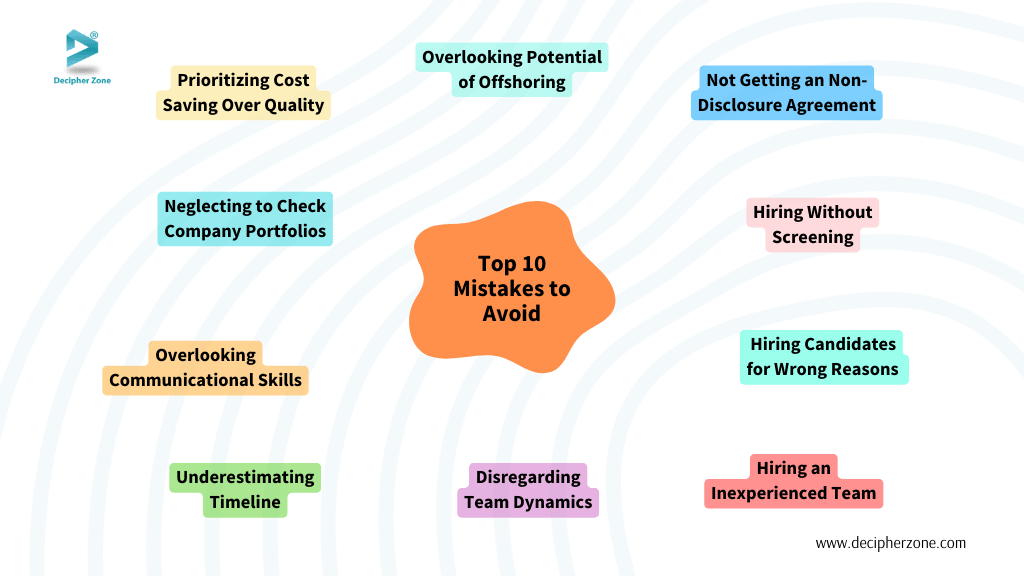This blog explores the top 10 mistakes to avoid hiring a software development company that can make-or-break decision for your business. from choosing the most affordable option to neglecting post-launch support. We dive into common traps, offer analogies for clarity, and provide actionable insights, ensuring you’re fully prepared to pick the right partner for your software project.
Finding the right software development company is a struggle of its own. It’s almost similar to finding yourself the ideal partner. If you get it right, you’re on the right track to building something precious; get it wrong you’re left with missed deadlines, lost opportunities, and worst of all, wasted money.
But don’t sweat it, this blog has got your back. We’ll break down the most common traps businesses fall into when outsourcing software development, so you avoid those cringe-worthy mistakes and make a game-changing decision for your business.
10 Top Most Common Mistakes to Avoid When Hiring a Software Development Company
To save you from the ordeal of choosing the wrong development partner, draining your bank account, and investing your invaluable time, we have created a list of the top 10 most common mistakes you should avoid when hiring a software development company.
1. Prioritizing Cost Saving Over Quality
Selecting the partner while keeping the cost in consideration is a good thing, yet, reducing the selection to the associated cost only can lead to development issues in the long run. While securing a low price may seem advantageous at first glance, it is essential to recognize that this approach can harbor various pitfalls.
For example, partners who can offer services at a lower cost may not deliver the quality you would expect, leading to subpar work outputs that don’t meet the requirements of the project. Another issue that might arise from this is delays in deliverables and derailed project timelines which manifest into compromised project success and spending more money to rectify issues that arise due to inadequate initial selections. This makes it essential to balance cost and quality to guarantee a successful project outcome.
2. Neglecting to Check Company Portfolios
No one buys a house without making sure that its foundation is strong. Similarly, while choosing the right partner for your project, you need to have the same level of scrutiny. Never make the mistake of overlooking the company’s portfolio, it holds the key to its proven track record data.
Checking their portfolios will help you look into vital information including their experience, reviews, testimonials from past clients, and even case studies. These details can shed light on how they have handled specific challenges and achieved successful outcomes, offering you insights into their problem-solving capabilities and adaptability.
Simply put, by taking the time to analyze this information, you can make informed decisions about the partners you choose to unite with, assuring that you build a strong foundation for your project’s success.
3. Overlooking Communicational Skills
Effective communication is absolutely essential for the successful development of software solutions. Consider the alarming scenario of informing a doctor about an allergy to a specific medication, only to find that they prescribe that very same medicine, this could lead to a serious health crisis, wouldn’t it?
When you are in the process of selecting an outsourcing partner for software development, it is important to choose a team that excels in technical skills and has clear and fluent communication capabilities.
If their initial interactions with you lack clarity or appear vague, view this as a red flag that should lead you to reconsider your choice. Poor communication during the hiring process is often indicative of more substantial communication issues that may arise during the actual development phase, potentially jeopardizing the success of your project.

4. Underestimating Timeline
Software development is a complex process that requires careful planning and execution. It involves various stages, from initial design and prototyping to coding, testing, and deployment. Underestimating the time required to complete a project can lead to several issues, such as compromised quality, hasty work, and ultimately, missed opportunities for innovation and improvement.
Therefore, it is important to have a transparent and open discussion about timelines for deliverables and leave room for potential adjustments. If the promises sound too good to be true, then trust your gut because it sure is.
5. Disregarding Team Dynamics
Each team member in the development team needs to be on the same page, the same as an orchestra where each musician plays in harmony to create a beautiful composition. If the team dynamics are off, it will create tons of misunderstandings, confusion, low morale, and ultimately a disaster in the name of the project.
To avoid this, all you have to do is ask the company how the team works together and who will be the primary point of contact. Needless to say, a well-coordinated team can save you from unnecessary headaches and setbacks, guaranteeing that the project keeps moving forward smoothly.
6. Hiring an Inexperienced Team
Would you trust a first-year medical student to perform surgery on you? Probably not. While everyone needs to start somewhere, do you really want to be that learning opportunity when the stakes are so high? Hiring a development team with limited experience might save you some money initially, but it can end up costing you much more down the road due to mistakes, bugs, and inefficiencies.
Look for companies that have a proven track record of working with projects related to your industry. If they have successfully delivered multiple projects before, they’re more than likely to deliver great results for you too.
7. Hiring Candidates for Wrong Reasons
Often, businesses fall prey to “shiny object syndrome.” They end up hiring for all the wrong reasons, namely, being drawn to the most enthusiastic applicants, relying on past experiences listed on resumes, or getting swayed by the flashiest websites, all without thoroughly assessing a candidate's true potential and abilities.
When you are hiring developers, it shouldn't feel like a popularity contest; instead, it should be more centered on the right mix of skills, experience, compatibility, and expertise. Don’t be lured in by superficial perks; take the time to dig deeper and uncover their true capabilities and how well they align with your business needs.
8. Hiring Without Screening
Would you invite someone to move in with you without ever meeting them? Sounds bizarre, right? Skipping the screening process before outsourcing to a software development company is the same. It will lead to severe setbacks, errors, feature incompatibility, and, ultimately, project failure.
To overcome this, set up multiple interviews with the team, read their reviews, ask for references, and analyze their tech and soft skills through logical and technical questions. This extra effort can save you from any problems in the future.
9. Overlooking Potential of Offshoring
Although offshoring has gained a bad reputation thanks to a few agencies, dismissing it entirely could mean missing out on talented developers and cost-efficient options. If done right, offshoring can be similar to finding a hidden gem at a flea market. It can give you access to a global talent pool and deliver quality work within your time and budget.
Instead of ruling it out entirely, carefully analyze the available options. Conduct interviews, assess their communication skills, and evaluate their experience and expertise. By doing this, you’ll be able to identify some of the best options available.
10. Not Getting an NDA
Without signing a Non-Disclosure Agreement (NDA), there's no guarantee that your designs, ideas, information, and software details will remain confidential. Your project ideas are your intellectual property that should remain protected and confidential. Make sure that the NDA is in place before engaging in any serious discussions. It’s a small step that can save you from a lot of financial and legal headaches.
Wrapping it Up
Finding the right partner is always a tricky part of hiring a software development company. The path to connecting with the right development partner is often fraught with several pitfalls. Think of it as putting together the perfect choir where you need to harmonize portfolios, references, cultural alignment, communication skills, and transparency, among other factors, to create a symphony.
Simply put, the success of your software project hinges on due diligence and a strategic approach while choosing the ideal partner for development. After all, your business deserves nothing less than the best.
That being said, you can hire a dedicated team of developers from the extensive talent pool of Decipher Zone, who are well-versed in technologies and tools, making it seamless to achieve your dream project within your budget and timeline. So what are you waiting for? Get in touch with us today!

FAQs
-
How do I know if a software development company is a good fit for my business?
To determine if a software development company suits your business, consider their technical expertise, communication skills, testimonials, references, development methodologies, post-launch support, and cultural fit.
-
What are common red flags when hiring a software development company?
Some of the conveniently neglected red flags that you should keep an eye out for while outsourcing your project to a software development company are lack of transparency, complex contracts, unrealistic budgets and timelines, and unwillingness to provide references. If you see some of these, it’s time to run from them as far as you can and never look back.
-
What should be included in a software development contract?
A few clauses that must be included in the development contract are project timelines, deliverables, payment terms, confidentiality, intellectual property ownership, post-launch support, scalability, and more to avoid any future surprises down the road.

